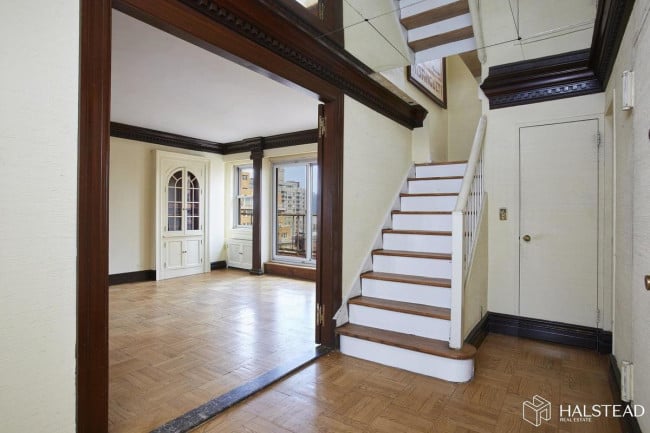My co-op board interview: I didn't catch the clue to the building's culture

The buyer was told not to include a glowing letter of recommendation from a condo board in a different city. They were happy he had come in and changed so many things in his former building.
Compass via StreetEasy
A board interview is the final step to approval when buying a co-op unit in New York City. In this series, New Yorkers tell Brick Underground about their experience with the interview process, what worked and what didn’t—and what you can learn. Have a story to share? Drop us an email. We respect all requests for anonymity.
This week, Louis Alcamo, a pseudonym, shares his experience buying two co-ops, both near Gramercy Park. Alcamo, who works in human resources, bought the first one eight years ago before selling and buying a one bedroom in 2017. In the first, he fielded awkward questions from an eccentric board president and in his second, he received clues to how the board might operate, which he overlooked because he was hooked on the apartment. Next time, he says, he will be much more forthright about getting answers from the board about house rules and the way they operate before he puts in an offer.
You've bought two NYC co-ops in the last decade—how did the interviews differ?
In the first interview, the board president asked some weird questions—he was out of work, and asked if I could get him a job because he thought I was in HR! Then he started asking about financials like stock options and how I thought they were going to do and I said, "I don’t know, is that a problem?” The other guy shut him down saying, "No, you’re financials are fine and we can stop that questioning.” I was like, be as cool as you can, answer their questions, don’t offer more than they are asking, and move forward. You want to appear likeable and agreeable. They could have asked me anything, I would have answered the question.
Did that translate into problems within the co-op?
The board president was just eccentric. Later I had a mold problem because the air conditioner flooded and I wanted to get the air tested in the apartment. The management said they had nothing to do with it and would not recommend anyone even though I was happy to pay for it. I found someone myself and got the air tested and found mold. The company told me to notify my neighbors, which I did, as well as the board. The president stopped me and told me that was totally unnecessary. I told him, no, it wasn’t. They actually fixed and resolved the issue and were very good about it. It wasn't a problem.
How did the interview for the second co-op differ?
There were three or four board members that time and I was moving back from Seattle. I had a letter of recommendation from a condo I had lived in there—I had helped them revamp some issues around security, how people were welcomed into the building, and [resident] orientation. I also organized a poll because [the building] allowed seven-day construction and I felt that it shouldn’t be allowed, so I had given them a lot of input and the board president wrote me a letter about how they were happy I came in and challenged things. My broker asked me to remove that from my board package and now I know why: The board did not want to be confronted or challenged.
That should have been a clue and I didn’t take it because I really liked my apartment. It ticked a lot of my boxes. They did share some rules with me during the interview that I was like, 'Whoa.' They don't allow food deliveries up to the apartment or window air conditioning units. Those are things I can live with.
They didn’t ask any financial questions. It was a 15-minute interview and they asked why I wanted to live in the building and that was easy because I had lived in the neighborhood for six years before, so it was coming home for me—that was an easy answer.
You say it should have been a clue—how does the co-op operate?
Now that I’m living [in the apartment], the board does not want to hear about improvements. I have had multiple issues in the building; I’ve been flooded by my upstairs neighbor three times, twice I was away and they didn't notify me; I’ve had to clean the garbage chute rooms because they're not being cleaned; there’s apparently a rodent issue in the building; the lobby is messy; the doormen are eating as people are coming in. All of these things they don’t want to hear about it and if I had submitted that letter they probably would have rejected me because I’m someone who speaks up.
Were there any other hints about this during the interview?
No, they were all lovely. I didn’t ask a lot of questions about how they worked. In the future, I might do that. By the time you get to the board interview, you are really committed. You have gone through two or three months of figuring out the financing, and how you are going to move. I think if the interview process happened earlier and allowed you to ask more open questions I might have said that it wasn’t the right building for me.
You really don’t know the culture of the building until you live there. It’s also hard to get the brokers to be honest because they want a sale. I actually asked about window air conditioners the day I looked at the apartment and I was told there would be no problem.
What would you do differently next time?
I’d ask if I could contact the building management and get the building rules. I'd find out about the frequency of communications from the board and what they look like. I’d like to see copies of notes from the board. I’d do this before I put in an offer. The board probably wouldn't be open to all of that but next time, if the building won’t answer my questions before I sign a contract I’d say, that’s not the right building for me. The fact that a very nice letter around how I helped a building improve would have offended the board—it should have been a clue to me, but I totally missed it.
I did contact my broker to say, what’s it going to take to get me out of here? But I decided, because prices are where they are at, to stay put for a little while and try to make a difference. So I’m now raising my voice. If they don't start to address the issues it's going to drive down prices.
You Might Also Like





























